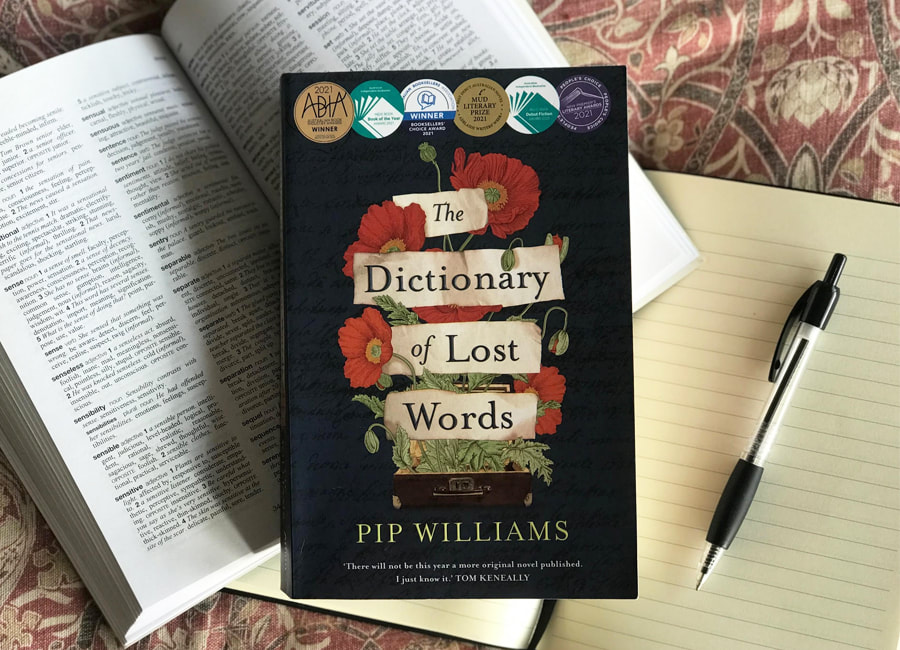Published by Affirm Press 2020 | Historical Fiction, Australian author Pip Williams’ wonderfully original debut, The Dictionary of Lost Words, is a logophile’s dream.
She has woven a brilliantly imagined fictional story around the very real circumstances of a word - ‘bondmaid' – that was quite literally lost by the editors compiling the Oxford English Dictionary. In Williams’ version of events, the word was stolen, unnoticed, by an irrepressibly curious young girl, Esme Nicoll - the daughter of one of the lexicographers working on the dictionary, in 1887. And as we follow Esme’s unconventional life, which is entwined with the development of the dictionary - from her childhood days spent hidden under the lexicographers' desks as they worked on the ‘A’ word definitions, right through to earning her own desk among them - Williams offers a fascinating exploration of the role gender may have played in the meaning of words, why some were considered more important than others, and why some were not recorded at all. But first, how did the real editors lose a word? Based on Williams’ meticulously researched recreation it seems quite amazing they didn’t lose more. Compiling the first Oxford English Dictionary was a gargantuan task, spanning almost seven decades from 1857 – and multiple editors. The first complete volume released in 1928 defined almost 415,000 words. To help capture all their shades of meaning, many hundreds of volunteers were invited to submit by post short quotations written on small slips of paper. As a result, the lexicographers received millions of slips of paper. When Dr James Murray was appointed editor in 1879, he took steps to improve the organisation of the paper slips, including building more than 1000 pigeon holes in a shed constructed in the garden of his home, named the “Scriptorium” (around which much of the fictionalised world of William’s Esme revolves). Into those holes, the lexicographers filed the thousands of paper slips arriving every day. Aside from the words that Dr Murray deliberately discarded, the slip on which ‘bondmaid’ was defined was apparently the only one misplaced thus omitted from the first published fascicles. In Williams' fictionalised account, when the forgotten slip fluttered unnoticed into young Esme’s hands, it sparked in her a lifelong quest to “collect” other disregarded words. And as she did so she uncovered many words – and a way of life – she otherwise never would have, in effect reclaiming and celebrating the language of women lost in her male-dominated world. Besides Williams’ well-crafted story which captures beautifully the zeitgeist of the women’s suffrage movement in England at the time, I was fascinated by her inferences around why the words Esme discovered had been shunned. Equally fascinating, and heartening, was her inclusion of the (real) women who contributed to the Oxford English Dictionary. Williams did not let the dearth of public information stop her from creating rich characterisations of women such as Elsie and Rosfrith Murray, who worked alongside their father the editor Dr Murray (Williams has even included in her author’s endnotes a rare historic photo of the three of them in 1915); and Edith Thompson, a prolific volunteer contributor to the Dictionary. Williams’ portrayal of these women adds a wonderful new depth to the popular mythology surrounding the creation of the dictionary, complementing other great historical fiction such as one of my other favourites, Simon Winchester’s The Surgeon of Crowthorne (later adapted as The Professor and the Madman), a brilliant fictionalised account of one of the more eccentric dictionary contributors. Our understanding not only of the dictionary’s creation, but also the power of nuance in the way words are defined, is all the more rich for the many hours spent by Williams – who was born in London, but now calls South Australia’s Adelaide Hills home – at the Oxford University Press delving into the archives of the Oxford English Dictionary, to bring us such a moving, heartfelt, intelligent and thoughtful story. And as for ‘bondmaid’? The word finally made its debut in the Oxford Dictionary in 1933. Comments are closed.
|
Categories
All
Archives
May 2024
|

